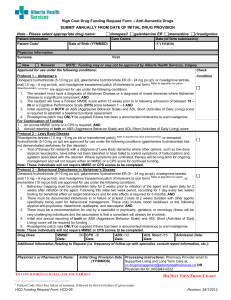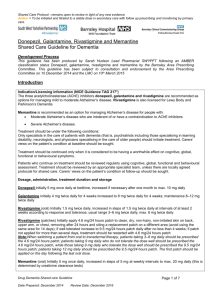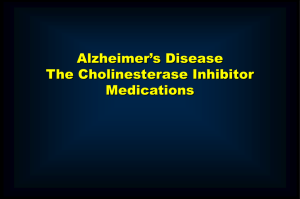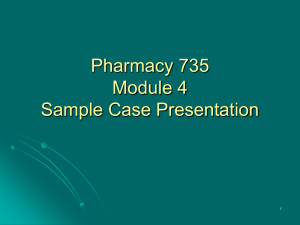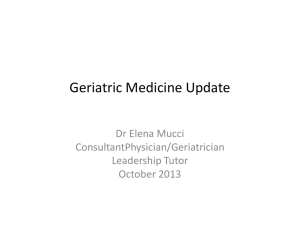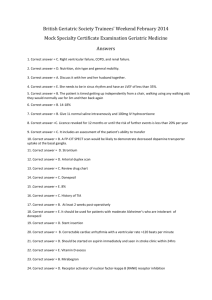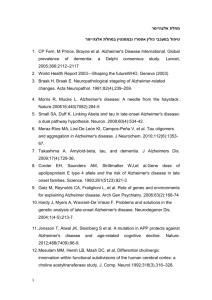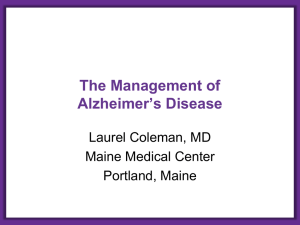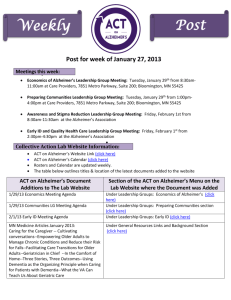Donepezil - Wolverhampton Formulary
advertisement
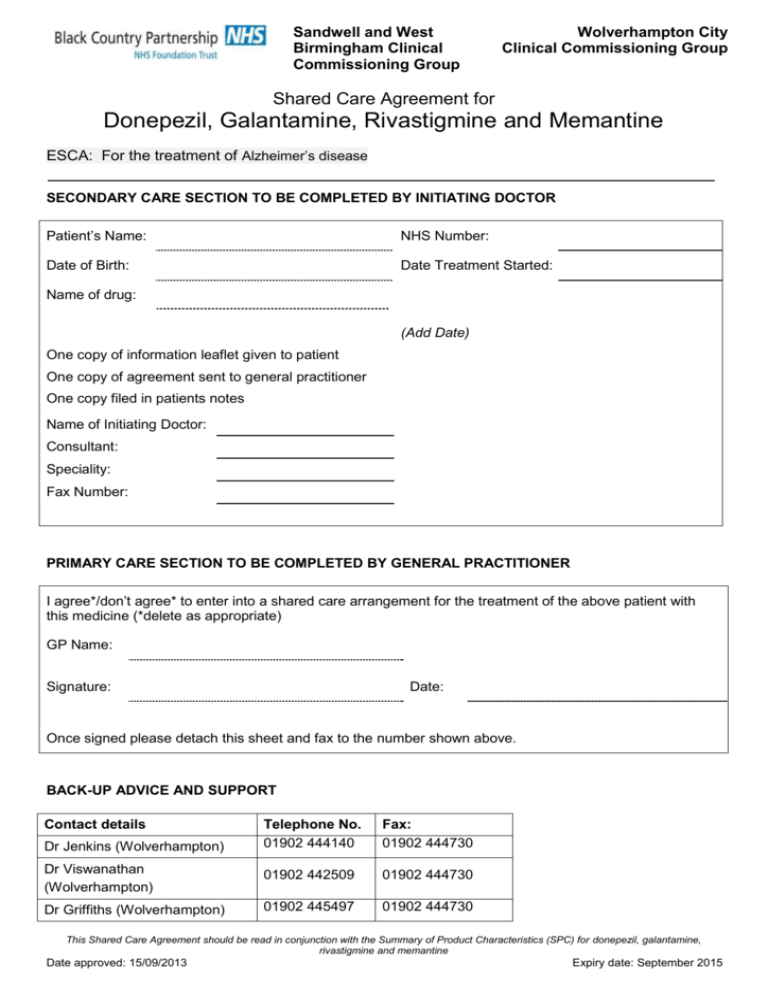
Sandwell and West Birmingham Clinical Commissioning Group Wolverhampton City Clinical Commissioning Group Shared Care Agreement for Donepezil, Galantamine, Rivastigmine and Memantine ESCA: For the treatment of Alzheimer’s disease SECONDARY CARE SECTION TO BE COMPLETED BY INITIATING DOCTOR Patient’s Name: NHS Number: Date of Birth: Date Treatment Started: Name of drug: (Add Date) One copy of information leaflet given to patient One copy of agreement sent to general practitioner One copy filed in patients notes Name of Initiating Doctor: Consultant: Speciality: Fax Number: PRIMARY CARE SECTION TO BE COMPLETED BY GENERAL PRACTITIONER I agree*/don’t agree* to enter into a shared care arrangement for the treatment of the above patient with this medicine (*delete as appropriate) GP Name: Signature: Date: Once signed please detach this sheet and fax to the number shown above. BACK-UP ADVICE AND SUPPORT Contact details Telephone No. 01902 444140 Fax: 01902 444730 Dr Viswanathan (Wolverhampton) 01902 442509 01902 444730 Dr Griffiths (Wolverhampton) 01902 445497 01902 444730 Dr Jenkins (Wolverhampton) This Shared Care Agreement should be read in conjunction with the Summary of Product Characteristics (SPC) for donepezil, galantamine, rivastigmine and memantine Date approved: 15/09/2013 Expiry date: September 2015 Sandwell and West Birmingham Clinical Commissioning Group Wolverhampton City Clinical Commissioning Group Shared Care Agreement for Donepezil, Galantamine, Rivastigmine and Memantine ESCA: For the treatment of Alzheimer’s disease Dr Prasanna (Wolverhampton) 01902 575151 01902 444730 Memory Clinic (Wolverhampton) 01902 445794 01902 444730 Dr Lowe (Sandwell) 0121 6128203 0121 6128200 Dr Curran (Sandwell) 0121 6128202 0121 6128200 Dr Qassem (Sandwell) 0121 6128211 0121 6128200 Dr Blissett (Sandwell) 0121 6128206 0121 6128200 BCPFT Pharmacy Dept: Mr Tim Kingscote-Davies 0121 6128609 0121 6128611 CCG Pharmacist (Wolverhampton): Mr David Birch 01902 575184 01902 444522 This Shared Care Agreement should be read in conjunction with the Summary of Product Characteristics (SPC) for donepezil, galantamine, rivastigmine and memantine Date approved: 15/09/2013 Expiry date: September 2015 Sandwell and West Birmingham Clinical Commissioning Group Wolverhampton City Clinical Commissioning Group Shared Care Agreement for Donepezil, Galantamine, Rivastigmine and Memantine ESCA: For the treatment of Alzheimer’s disease Patient’s Name: NHS Number: Date of Birth: Date treatment commenced: Name of drug, form and dosage: AREAS OF RESPONSIBILITY FOR THE SHARING OF CARE This shared care agreement outlines suggested ways in which the responsibilities for managing the prescribing of donepezil, galantamine, rivastigmine and memantine for the treatment of Alzheimer’s disease can be shared between the specialist and general practitioner (GP). GPs are invited to participate. If GPs are not confident to undertake these roles, then they are under no obligation to do so. In such an event, the total clinical responsibility for the patient for the diagnosed condition remains with the specialist. If a specialist asks the GP to prescribe this drug, the GP should reply to this request as soon as practicable. Note that this ESCA does not include the use of any of these medicines outside their licensed indications. Sharing of care assumes communication between the specialist, GP and patient. The intention to share care should be explained to the patient by the doctor initiating treatment. It is important that patients and carers are consulted about treatment and are in agreement with it. The doctor/non-medical prescriber who prescribes the medication legally assumes clinical responsibility for the drug and the consequences of its use. RESPONSIBILITIES and ROLES Specialist responsibilities Confirm diagnosis of Alzheimer’s disease using cognitive, global, functional and behavioural assessment. Carers’ views on the patient’s condition at baseline should be sought. The three AChE inhibitors donepezil, galantamine and rivastigmine are recommended as options for managing mild to moderate Alzheimer’s disease. Memantine is an option for managing Alzheimer’s disease for people with moderate Alzheimer’s disease who are intolerant of or have a contraindication to AChE inhibitors or severe Alzheimer’s disease. The least expensive drug should normally be chosen as first line, unless there are patient specific reasons not to. Obtain consent and ensure provision of information on disease, treatment, benefits, side-effects and discontinuation of medication to patient and/or carer. Initiate treatment in accordance with NICE guidance and provide medication until prescribing is transferred to the GP. Send a letter to the GP to obtain consent to share prescribing responsibility, informing the GP of formal assessments undertaken, results and confirmation that the patient has mild, moderate or severe Alzheimer’s disease. Complete the Secondary Care Section of the Shared Care Agreement and send to the GP. If patient already using a blister pack or dossett box for medication, ask the GP to initiate the medication, with close supervision and guidance. Advise the GP of the medication and dosage to be prescribed and any dosage adjustments required. Liaise with the GP after each review and as necessary. The Community Mental Health Team (CMHT) will provide ongoing monitoring and support. Once stabilised, review patient’s clinical condition, carer’s views, response to treatment, drug compliance and use cognitive, global, functional and behavioural assessment every 6 months. Communicate these results and any dosage adjustments promptly to the GP. Review and consider discontinuing treatment if there is no clinically significant benefit. Treatment should be continued only when it is considered to be having a worthwhile effect on cognitive, global, functional or behavioural symptoms. This Shared Care Agreement should be read in conjunction with the Summary of Product Characteristics (SPC) for donepezil, galantamine, rivastigmine and memantine Date approved: 15/09/2013 Expiry date: September 2015 Sandwell and West Birmingham Clinical Commissioning Group Wolverhampton City Clinical Commissioning Group Shared Care Agreement for Donepezil, Galantamine, Rivastigmine and Memantine ESCA: For the treatment of Alzheimer’s disease Ensure that backup advice is available at all times. Advise and support patients and their carers. Notify the GP of patient’s failure to attend appointments. Report adverse events to the Medicines and Healthcare products Regulatory Agency (MHRA) using the yellow card system. General Practitioner responsibilities 1 Reply to the specialist requesting shared care. 2 Complete the Primary Care Section of the Shared Care Agreement and return to the Specialist 3 Provide repeat prescriptions following initiation by specialist, at dose advised, ensuring no interacting drugs are prescribed. It is recommended that no more than one month’s prescription should be issued at a time. 4 Report to and seek advice from the specialist on any aspect of patient care that is of concern to the GP and may affect treatment. 5 Act upon results communicated by specialist. 6 Encourage patient’s ongoing engagement with secondary care services. 7 If patient’s condition deteriorates the GP should advise the specialist for earlier review. 8 Ensure all relevant staff within the practice are aware of the shared care guidelines. Patient's role Report to the GP or specialist if he or she does not have a clear understanding of the treatment. Ensure regular attendance at appointments for review and monitoring. Be aware of side effects and report any adverse effects to the specialist or GP. Inform the GP or specialist if health problems arise. This Shared Care Agreement should be read in conjunction with the Summary of Product Characteristics (SPC) for donepezil, galantamine, rivastigmine and memantine Date approved: 15/09/2013 Expiry date: September 2015 Sandwell and West Birmingham Clinical Commissioning Group Wolverhampton City Clinical Commissioning Group Shared Care Agreement for Donepezil, Galantamine, Rivastigmine and Memantine ESCA: For the treatment of Alzheimer’s disease SUPPORTING CLINICAL INFORMATION See current edition of the British National Formulary (BNF) and Summary of Product Characteristics (SPCs) for donepezil, galantamine, rivastigmine and memantine (http://www.emc.medicines.org.uk/) for full details of licensed indications, dosage and administration, contraindications, cautions, side-effects and drug interactions. DONEPEZIL: Indications Mild to moderate dementia in Alzheimer’s disease. Dosage and Administration Initially 5mg once daily at bedtime, increased if necessary after one month to maximum 10mg daily. If standard formulation not appropriate, donepezil orodispersible tablets may be prescribed. Place on the tongue, allow to disperse and swallow. Contraindications Known hypersensitivity to donepezil, piperidine derivatives, or to any excipients used in the formulation. Cautions Sick sinus syndrome or other supraventricular conduction abnormalities. Susceptibility to peptic ulcers. Asthma, chronic obstructive pulmonary disease. Hepatic impairment – caution in mild to moderate impairment, no information for severe impairment. Side Effects Nausea, vomiting, anorexia, diarrhoea, fatigue, insomnia, headache, dizziness, syncope, abnormal dreams, hallucinations, agitation, aggression, muscle cramps, urinary incontinence, rash, pruritus. Less commonly gastric and duodenal ulcers, gastro-intestinal haemorrhage, bradycardia, seizures. Interactions Donepezil possibly enhances the effect of suxamethonium but antagonises the effect of non-depolarising muscle relaxants. Donepezil has the potential to interfere with medications having anticholinergic activity. GALANTAMINE: Indications Mild to moderate dementia in Alzheimer’s disease. Dosage and Administration Initially 4mg twice daily for 4 weeks increased to 8mg twice daily for 4 weeks. Maintenance dose 8 – 12mg twice daily. Take with or just after food. Galantamine MR: Initially 8mg once daily for 4 weeks increased to 16mg once daily for 4 weeks. Maintenance dose 16-24mg daily. Swallow whole with or just after food. If standard formulations not appropriate, galantamine oral solution may be prescribed. Take with or just after food. Contraindications Hypersensitivity to the active substance or to any of the excipients. Since no data are available on the use of galantamine in patients with severe hepatic (Child-Pugh score greater than 9) and severe renal (creatinine clearance less than 9 ml/min) impairment, galantamine is contraindicated in these populations. Galantamine is contra-indicated in patients who have both significant renal and hepatic dysfunction. Cautions Cardiac disease (including sick sinus syndrome or other supraventricular conduction abnormalities, unstable angina, congestive heart failure). Electrolyte disturbances. Susceptibility to peptic ulcers. Asthma, chronic obstructive pulmonary disease, pulmonary infection. Avoid in urinary retention, gastro-intestinal obstruction and while recovering This Shared Care Agreement should be read in conjunction with the Summary of Product Characteristics (SPC) for donepezil, galantamine, rivastigmine and memantine Date approved: 15/09/2013 Expiry date: September 2015 Sandwell and West Birmingham Clinical Commissioning Group Wolverhampton City Clinical Commissioning Group Shared Care Agreement for Donepezil, Galantamine, Rivastigmine and Memantine ESCA: For the treatment of Alzheimer’s disease from bladder or gastro-intestinal surgery. History of seizures. Hepatic impairment - dose adjustment required in moderate hepatic impairment, avoid in severe impairment. Renal impairment – avoid if eGFR less than 9ml/minute/1.73m2. Side Effects Vomiting, nausea, abdominal pain, diarrhoea, dyspepsia, anorexia, weight loss, bradycardia, hypertension, syncope, hallucinations, depression, dizziness, tremor, headache, drowsiness, malaise, muscle spasm, sweating. Less commonly taste disturbances, palpitation, arrhythmias, first-degree AV block, hypotension, flushing, paraesthesia, dehydration, muscular weakness, blurred vision, tinnitus. Interactions Plasma concentration of galantamine increased by erythromycin, paroxetine and ketoconazole. Because of its mechanism of action, galantamine should not be given concomitantly with other cholinomimetics (such as donepezil and rivastigmine). Galantamine has the potential to antagonise the effect of anticholinergic medication. Galantamine enhances the effect of suxamethonium. RIVASTIGMINE: Indications Mild to moderate dementia in Alzheimer’s disease or in Parkinson’s disease. Dosage and Administration Initially 1.5mg twice daily, increased in steps of 1.5mg twice daily at intervals of at least 2 weeks according to response and tolerance; usual range 3-6mg twice daily; maximum 6mg twice daily. If treatment interrupted for more than several days, treatment should be retitrated from 1.5mg twice daily. Take with or just after food. Capsules must be swallowed whole. If standard formulation not appropriate, rivastigmine oral solution may be prescribed. Patches – initially apply 4.6mg/24 hours patch to clean, dry, non-hairy, non-irritated skin on back, upper arm, or chest, removing after 24 hours and siting a replacement patch on a different area (avoid using the same area for 14 days); if well tolerated increase to 9.5mg/24 hours patch daily after at least 4 weeks; if treatment interrupted for more than several days, treatment should be retitrated from 4.6mg/24 hours patch. When switching from oral to transdermal therapy, patients taking 3-6mg by mouth daily should initially switch to 4.6mg/24 hours patch (then titrate as above). Patients taking 9-12mg by mouth daily should switch to 9.5mg/24 hours patch. The first patch should be applied on the day following the last oral dose. Contraindications Hypersensitivity to the active substance rivastigmine, to other carbamate derivatives or to any of the excipients used in the formulation. Previous history of application site reactions suggestive of allergic contact dermatitis with rivastigmine patch. Cautions Gastric or duodenal ulcers (or susceptibility to ulcers). Monitor body weight. Sick sinus syndrome, conduction abnormalities. History of asthma or chronic obstructive pulmonary disease. History of seizures. Bladder outflow obstruction. Use with caution in hepatic and renal impairment. Side Effects Nausea, vomiting, diarrhoea, dyspepsia, anorexia, weight loss, increased salivation, abdominal pain, bradycardia, dizziness, headache, drowsiness, malaise, agitation, anxiety, tremor, confusion, insomnia, extrapyramidal symptoms (and worsening of Parkinson’s disease), sweating. Less commonly atrial fibrillation, AV block, depression, syncope. Interactions Rivastigmine enhances the effect of suxamethonium but antagonises the effect of non-depolarising muscle relaxants. Rivastigmine should not be given concomitantly with other cholinomimetic substances (such as donepezil and rivastigmine) and might interfere with the activity of anticholinergic medicinal products. This Shared Care Agreement should be read in conjunction with the Summary of Product Characteristics (SPC) for donepezil, galantamine, rivastigmine and memantine Date approved: 15/09/2013 Expiry date: September 2015 Sandwell and West Birmingham Clinical Commissioning Group Wolverhampton City Clinical Commissioning Group Shared Care Agreement for Donepezil, Galantamine, Rivastigmine and Memantine ESCA: For the treatment of Alzheimer’s disease MEMANTINE: Indications Moderate to severe dementia in Alzheimer’s disease Dosage and Administration Initially 5mg once daily, increased in steps of 5mg at weekly intervals to maximum 20mg daily. If standard formulation not appropriate, memantine oral solution may be prescribed. Treatment initiation packs also available. Contraindications Hypersensitivity to the active substance or to any of the excipients. Cautions History of convulsions. Avoid in severe hepatic impairment – no information available. Dose adjustment required in renal impairment. Avoid if eGFR less than 5ml/minute/1.73m 2. Side Effects Constipation, hypertension, dyspnoea, headache, dizziness, drowsiness. Less commonly vomiting, thrombosis, heart failure, confusion, fatigue, hallucinations and abnormal gait. Interactions Increased risk of CNS toxicity when memantine given with ketamine or dextromethorphan (manufacturer advises avoid concomitant use). Memantine possibly enhances anticoagulant effect of warfarin. Memantine possibly enhances effects of antimuscarincs. Memantine possibly reduces effects of antipsychotics. Memantine possibly enhances effects of dopaminergics and selegiline. Inreased risk of CNS toxicity when memantine given with amantadine (manufacturer advises avoid concomitant use). Memantine possibly modifies effects of baclofen and dantrolene. Version Control Version Date of Issue Author/s Brief Description of Changes 1.0 September 2011 Sue Horton Updated NICE Guidance to include memantine 2.0 August 2013 Sue Horton Review, minor alterations, supporting information separate for individual drugs inclusion of Sandwell Consultants, Wolverhampton CCG and Sandwell and West Birmingham CCG. This Shared Care Agreement should be read in conjunction with the Summary of Product Characteristics (SPC) for donepezil, galantamine, rivastigmine and memantine Date approved: 15/09/2013 Expiry date: September 2015
